#transitioning children is child abuse
Text
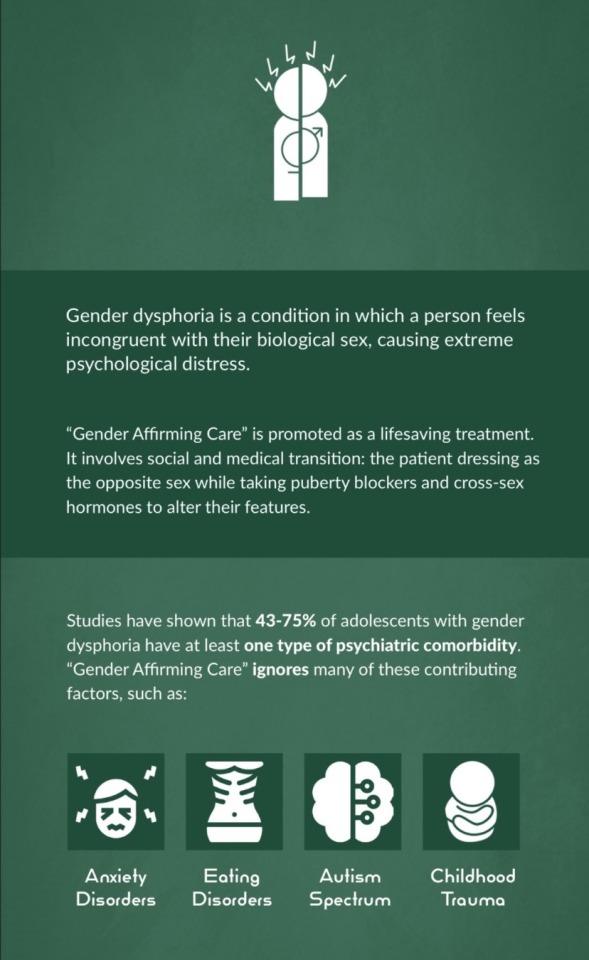
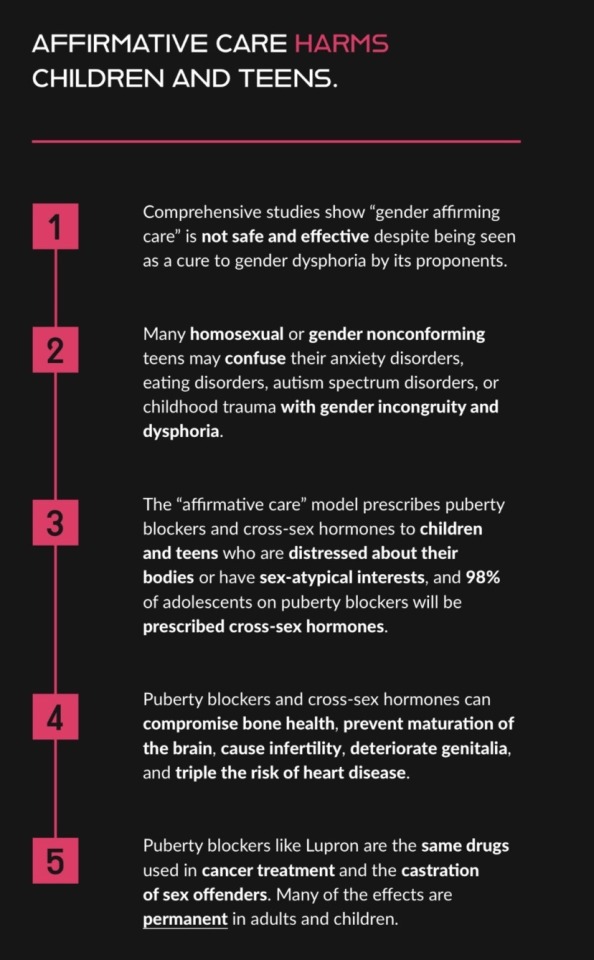
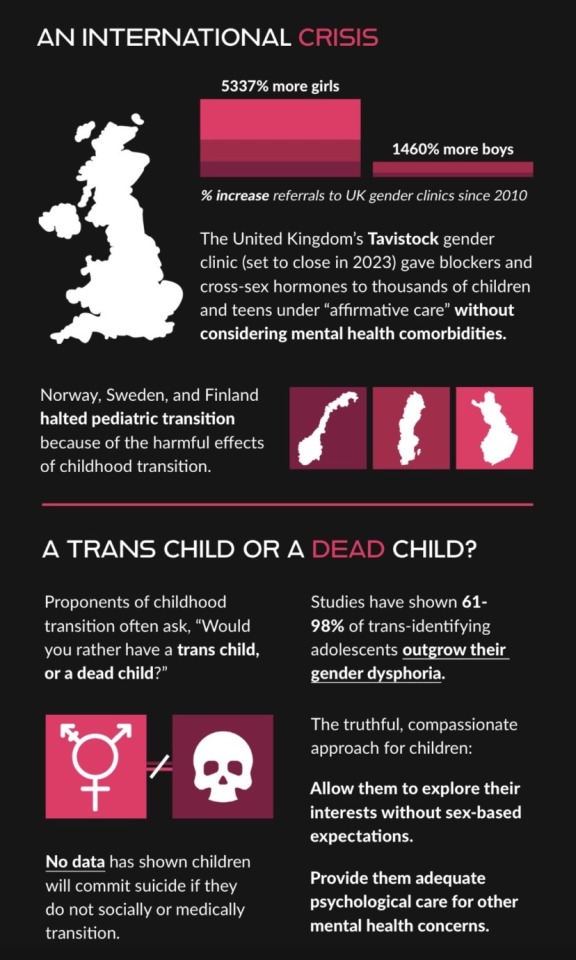
#radfem#feminism#radfems do touch#radical feminism#radblr#radfems do interact#radfems please touch#women deserve better#womens rights#sex based rights#gender critical#protect trans kids#gender dysphoria#sex dysphoria#let‘s be honest#transitioning children is child abuse#sterilizing and mutilating people as a whole so you can make profit and don’t have to deal with the actual problem is capitalistic butchery
188 notes
·
View notes
Text
-Currently, the side effects of childhood transition are downplayed by the medical industry, but links between hormone treatments and increased risk of heart disease, diabetes, and blood clots have been reported by PBS Frontline. Further, the American College of Pediatricians warns, “There is not a single long-term study to demonstrate the safety or efficacy of puberty blockers, cross-sex hormones and surgeries for transgender-believing youth.”
#save the children#gender abuse#child abuse#gender theory#gender confusion#health#childhood transition#medical industry#news#trump#truth#president trump#reporting#journalism
2 notes
·
View notes
Text
a transgender guy is forced to live as a girl and nobody bats an eye... A CISGENDER guy is forced to live as a girl and everyone loses their minds...

#WHAT'S SO HARD TO UNDERSTAND HERE!!!!!!!!!!#transgender people say it's damaging to live as a gender you don't wanna be. crazy#CISGENDER person has same life experience as many transgender people??? NOW you have credibility!#or in the case of david reimer 'that shows those TRAdfkgf that transitioning children is child abuse'#i haven't slept all night v_v#personaly
6 notes
·
View notes
Text
10 Key Strategies for Successful Foster System Transition to Independence
Introduction
10 Key Strategies for Successful Foster System Transition to Independence: Empower Foster Youth for a Brighter Future. Transitioning out of the foster system marks a crucial turning point in the lives of many young adults. It’s a period filled with both challenges and opportunities. In this blog post, we will explore effective strategies to help foster youth navigate this transition…

View On WordPress
#Foster care#Foster Child#Statistics#studio apartments#Supporting Safe and Stable Homes for Children#transitional living#Trauma-informed care Child abuse and neglect#Youth incarceration
0 notes
Text
So I've seen this circling in both TERF circles and in trans circles...
"Stop saying this is a genocide against trans people, that's disrespectful to Jewish people!"
First, it is perfectly accurate to call something a genocide when politicians are openly saying at rallies "transgenderism must be eliminated". That is calling for genocide!!
Second, there is more than one way to commit genocide; it doesn't just mean "forcing them to wear symbols, rounding them up and murdering them in camps". Genocide includes inflicting great harm to a group of people with the intent of erasing them from existence. Many different groups of people have had genocide committed against them, including the indigenous people of the Americas.
Denying trans people the right to transition, making it illegal to talk about trans people in school, forcibly detransitioning trans people, forcing them to live in the closet, forcing them to be sterilized in order to transition, labeling "living with a trans person" as child abuse so you can take away their children, and making it illegal to openly identify as trans, are all acts of genocide. They are all designed to destroy trans people.
13K notes
·
View notes
Text
The world is so hostile to tweens.....
Like we joke about how our schools growing up would ban the latest toy trends, but that reality genuinely horrific when you think about it. Like maybe 1% of the bans were based on safety, but the rest cited reasoning like
-"kids were bartering for collectibles" (kids learning about economics and product value)
-"kids were wearing them and the colors were too flashy" (kids experimenting with self expression and fashion)
-"kids were playing with them during lunch and recess instead of using our rusted safety hazard playground" (kids utilizing their free time to do what helps *them* unwind).
Play areas specifically geared towards children and especially towards teens are constantly being shut down. "Oh kids today are always on their phones!" Maybe because
-there are barely any arcades left and even less arcades that aren't adult-oriented,
-public pools and gyms are underfunded and shut down,
-"no loitering" laws prevent kids and teens from just hanging out,
-movie theatres only play the latest films and ticket prices are only rising,
-parks and playgrounds are either neglected or replaced with gear only directed at toddlers and unsuitable for anyone older
-genuine children's and young teen media is being phased out in favour of media directed only at very small children or older teens and adults.
-suburbs and even cities are becoming more and more hostile to pedestrians, it's just not safe for kids to walk to or ride their bikes to their friends' houses or other play destinations
Children's agency is hardly ever respected. Kids between the ages of 9-13 are either treated as babies or as full-grown adults, with no in-between. When they ask to be given more independence, they are either scoffed at or given more responsibilities than are reasonable for a child their age.
This is even evident in the fashion scene.
Clothing stores and brands like Justice and Gap are either closing or rebranding to either exclusively adult clothing or young children's clothes, with no middle ground for tweens. Tweens have to choose between clothes designed for adults that are too large and/or too mature for their age and bodies, or more clothes they feel are far too childish. For tween girls especially it's either a frilly pinafore dress with pigtails or a woman's size dress with cleavage. No wonder tween girls these days dress like they're older, it's because their other option is little girl clothes and they don't want to feel childish.
And then when tweens go to school, the books they want to read aren't available because they cover "mature" topics (read: oh no two people kissed and they weren't straight or oh no menstruation was mentioned or oh no a religion other than Christianity is depicted), so kids are left with books for way below their reading level. No wonder kids today are struggling with literacy, it's because they can't exercise and expand their reading skills with age-appropriate books. Readers need to be challenged with new words and concepts in order to grow in their skills, only letting tween read Dr. Seuss and nursery rhymes doesn't let them learn.
Discussions about substance use, reproduction, and sexuality aren't taught at an age-appropriate level in school or even by children's parents, so they either grow up ignorant and more vulnerable to abuse, or they seek out information elsewhere that is delivered in a less-than-age-appropriate manner. It shouldn't be a coin-toss between "I didn't know what sex was until I was 18 and in college" or "my first exposure to sex as a tween was through porn" or "I didn't know what sex was so I didn't know I was being sexually abused as a kid."
Tweenhood is already such a volatile and confusing time for kids, their bodies are changing and they're transitioning from elementary to middle to high school. It's hard enough for them in this stage, but it's made worse by how society devalues and fails them.
We talk about the disappearance of teenagehood, and maybe that's gonna happen in the future, but the erasure of tweenhood is happing in real time, and it's having and going to have major consequences for next generation's adults.
#leftie shit#i guess#ageism#social issues#tweenhood#the disappearance of tweenhood#current events#relevant issues
12K notes
·
View notes
Text
When something bad happens to someone who follows a lifestyle I like, it's a bug. When something bad happens to someone who follows a lifestyle you promote, it must be a feature and proof that you are evil.
#ventposting#People can manipulate impressionable individuals into abusive situations with anything. Literally anything.#It is not proof that the thing the abuser uses is evil.#How about let children make their own decisions about their gender. There is no unified trans agenda to force children to transition.#While abusive individuals can use the topic to hurt people#It is not proof that transgenderism is evil.#Every time the topic of trans kids comes up#I don't want to hear the adults' opinions and fears#I want to hear what the child thinks and whether they're informed.#I want dry boring in-depth analysis and children being respected.#Not clickbait articles.
0 notes
Text
Holy shit, the New York Times is FINALLY interviewing and listening to detransistioners.
The tide is turning.
Opinion by Pamela Paul
As Kids, They Thought They Were Trans. They No Longer Do.
Feb. 2, 2024
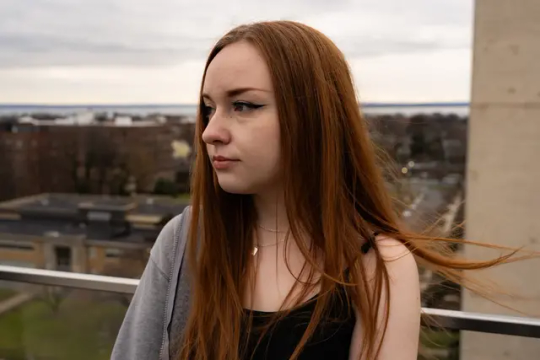
Grace Powell was 12 or 13 when she discovered she could be a boy.
Growing up in a relatively conservative community in Grand Rapids, Mich., Powell, like many teenagers, didn’t feel comfortable in her own skin. She was unpopular and frequently bullied. Puberty made everything worse. She suffered from depression and was in and out of therapy.
“I felt so detached from my body, and the way it was developing felt hostile to me,” Powell told me. It was classic gender dysphoria, a feeling of discomfort with your sex.
Reading about transgender people online, Powell believed that the reason she didn’t feel comfortable in her body was that she was in the wrong body. Transitioning seemed like the obvious solution. The narrative she had heard and absorbed was that if you don’t transition, you’ll kill yourself.
At 17, desperate to begin hormone therapy, Powell broke the news to her parents. They sent her to a gender specialist to make sure she was serious. In the fall of her senior year of high school, she started cross-sex hormones. She had a double mastectomy the summer before college, then went off as a transgender man named Grayson to Sarah Lawrence College, where she was paired with a male roommate on a men’s floor. At 5-foot-3, she felt she came across as a very effeminate gay man.
At no point during her medical or surgical transition, Powell says, did anyone ask her about the reasons behind her gender dysphoria or her depression. At no point was she asked about her sexual orientation. And at no point was she asked about any previous trauma, and so neither the therapists nor the doctors ever learned that she’d been sexually abused as a child.
“I wish there had been more open conversations,” Powell, now 23 and detransitioned, told me. “But I was told there is one cure and one thing to do if this is your problem, and this will help you.”
Progressives often portray the heated debate over childhood transgender care as a clash between those who are trying to help growing numbers of children express what they believe their genders to be and conservative politicians who won’t let kids be themselves.
But right-wing demagogues are not the only ones who have inflamed this debate. Transgender activists have pushed their own ideological extremism, especially by pressing for a treatment orthodoxy that has faced increased scrutiny in recent years. Under that model of care, clinicians are expected to affirm a young person’s assertion of gender identity and even provide medical treatment before, or even without, exploring other possible sources of distress.
Many who think there needs to be a more cautious approach — including well-meaning liberal parents, doctors and people who have undergone gender transition and subsequently regretted their procedures — have been attacked as anti-trans and intimidated into silencing their concerns.
And while Donald Trump denounces “left-wing gender insanity” and many trans activists describe any opposition as transphobic, parents in America’s vast ideological middle can find little dispassionate discussion of the genuine risks or trade-offs involved in what proponents call gender-affirming care.
Powell’s story shows how easy it is for young people to get caught up by the pull of ideology in this atmosphere.
“What should be a medical and psychological issue has been morphed into a political one,” Powell lamented during our conversation. “It’s a mess.”
A New and Growing Group of Patients
Many transgender adults are happy with their transitions and, whether they began to transition as adults or adolescents, feel it was life changing, even lifesaving. The small but rapidly growing number of children who express gender dysphoria and who transition at an early age, according to clinicians, is a recent and more controversial phenomenon.
Laura Edwards-Leeper, the founding psychologist of the first pediatric gender clinic in the United States, said that when she started her practice in 2007, most of her patients had longstanding and deep-seated gender dysphoria. Transitioning clearly made sense for almost all of them, and any mental health issues they had were generally resolved through gender transition.
“But that is just not the case anymore,” she told me recently. While she doesn’t regret transitioning the earlier cohort of patients and opposes government bans on transgender medical care, she said, “As far as I can tell, there are no professional organizations who are stepping in to regulate what’s going on.”
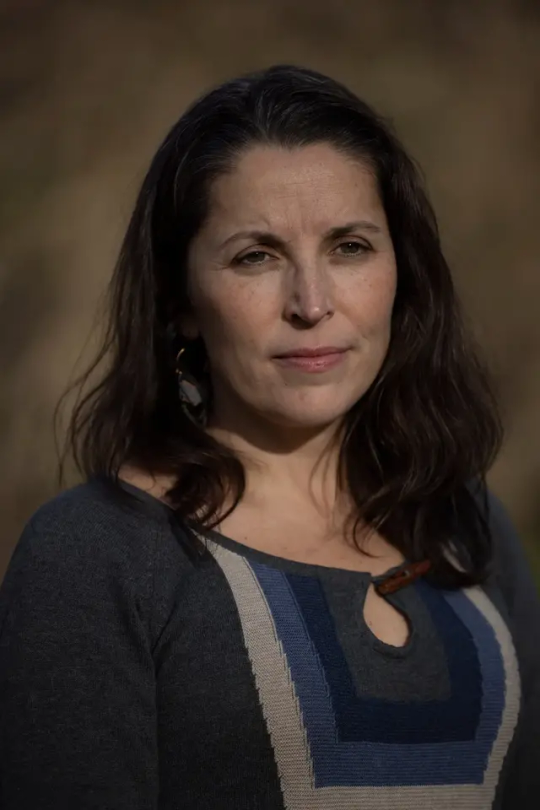
Most of her patients now, she said, have no history of childhood gender dysphoria. Others refer to this phenomenon, with some controversy, as rapid onset gender dysphoria, in which adolescents, particularly tween and teenage girls, express gender dysphoria despite never having done so when they were younger. Frequently, they have mental health issues unrelated to gender. While professional associations say there is a lack of quality research on rapid onset gender dysphoria, several researchers have documented the phenomenon, and many health care providers have seen evidence of it in their practices.
“The population has changed drastically,” said Edwards-Leeper, a former head of the Child and Adolescent Committee for the World Professional Association for Transgender Health, the organization responsible for setting gender transition guidelines for medical professionals.
For these young people, she told me, “you have to take time to really assess what’s going on and hear the timeline and get the parents’ perspective in order to create an individualized treatment plan. Many providers are completely missing that step.”
Yet those health care professionals and scientists who do not think clinicians should automatically agree to a young person’s self-diagnosis are often afraid to speak out. A report commissioned by the National Health Service about Britain’s Tavistock gender clinic, which, until it was ordered to be shut down, was the country’s only health center dedicated to gender identity, noted that “primary and secondary care staff have told us that they feel under pressure to adopt an unquestioning affirmative approach and that this is at odds with the standard process of clinical assessment and diagnosis that they have been trained to undertake in all other clinical encounters.”
Of the dozens of students she’s trained as psychologists, Edwards-Leeper said, few still seem to be providing gender-related care. While her students have left the field for various reasons, “some have told me that they didn’t feel they could continue because of the pushback, the accusations of being transphobic, from being pro-assessment and wanting a more thorough process,” she said.
They have good reasons to be wary. Stephanie Winn, a licensed marriage and family therapist in Oregon, was trained in gender-affirming care and treated multiple transgender patients. But in 2020, after coming across detransition videos online, she began to doubt the gender-affirming model. In 2021 she spoke out in favor of approaching gender dysphoria in a more considered way, urging others in the field to pay attention to detransitioners, people who no longer consider themselves transgender after undergoing medical or surgical interventions. She has since been attacked by transgender activists. Some threatened to send complaints to her licensing board saying that she was trying to make trans kids change their minds through conversion therapy.
In April 2022, the Oregon Board of Licensed Professional Counselors and Therapists told Winn that she was under investigation. Her case was ultimately dismissed, but Winn no longer treats minors and practices only online, where many of her patients are worried parents of trans-identifying children.
“I don’t feel safe having a location where people can find me,” she said.
Detransitioners say that only conservative media outlets seem interested in telling their stories, which has left them open to attacks as hapless tools of the right, something that frustrated and dismayed every detransitioner I interviewed. These are people who were once the trans-identified kids that so many organizations say they’re trying to protect — but when they change their minds, they say, they feel abandoned.
Most parents and clinicians are simply trying to do what they think is best for the children involved. But parents with qualms about the current model of care are frustrated by what they see as a lack of options.
Parents told me it was a struggle to balance the desire to compassionately support a child with gender dysphoria while seeking the best psychological and medical care. Many believed their kids were gay or dealing with an array of complicated issues. But all said they felt compelled by gender clinicians, doctors, schools and social pressure to accede to their child’s declared gender identity even if they had serious doubts. They feared it would tear apart their family if they didn’t unquestioningly support social transition and medical treatment. All asked to speak anonymously, so desperate were they to maintain or repair any relationship with their children, some of whom were currently estranged.
Several of those who questioned their child’s self-diagnosis told me it had ruined their relationship. A few parents said simply, “I feel like I’ve lost my daughter.”
One mother described a meeting with 12 other parents in a support group for relatives of trans-identified youth where all of the participants described their children as autistic or otherwise neurodivergent. To all questions, the woman running the meeting replied, “Just let them transition.” The mother left in shock. How would hormones help a child with obsessive-compulsive disorder or depression? she wondered.
Some parents have found refuge in anonymous online support groups. There, people share tips on finding caregivers who will explore the causes of their children’s distress or tend to their overall emotional and developmental health and well-being without automatically acceding to their children’s self-diagnosis.
Many parents of kids who consider themselves trans say their children were introduced to transgender influencers on YouTube or TikTok, a phenomenon intensified for some by the isolation and online cocoon of Covid. Others say their kids learned these ideas in the classroom, as early as elementary school, often in child-friendly ways through curriculums supplied by trans rights organizations, with concepts like the gender unicorn or the Genderbread person.
‘Do You Want a Dead Son or a Live Daughter?’
After Kathleen’s 15-year-old son, whom she described as an obsessive child, abruptly told his parents he was trans, the doctor who was going to assess whether he had A.D.H.D. referred him instead to someone who specialized in both A.D.H.D. and gender. Kathleen, who asked to be identified only by her first name to protect her son’s privacy, assumed that the specialist would do some kind of evaluation or assessment. That was not the case.
The meeting was brief and began on a shocking note. “In front of my son, the therapist said, ‘Do you want a dead son or a live daughter?’” Kathleen recounted.
Parents are routinely warned that to pursue any path outside of agreeing with a child’s self-declared gender identity is to put a gender dysphoric youth at risk for suicide, which feels to many people like emotional blackmail. Proponents of the gender-affirming model have cited studies showing an association between that standard of care and a lower risk of suicide. But those studies were found to have methodological flaws or have been deemed not entirely conclusive. A survey of studies on the psychological effects of cross-sex hormones, published three years ago in The Journal of the Endocrine Society, the professional organization for hormone specialists, found it “could not draw any conclusions about death by suicide.” In a letter to The Wall Street Journal last year, 21 experts from nine countries said that survey was one reason they believed there was “no reliable evidence to suggest that hormonal transition is an effective suicide prevention measure.”
Moreover, the incidence of suicidal thoughts and attempts among gender dysphoric youth is complicated by the high incidence of accompanying conditions, such as autism spectrum disorder. As one systematic overview put it, “Children with gender dysphoria often experience a range of psychiatric comorbidities, with a high prevalence of mood and anxiety disorders, trauma, eating disorders and autism spectrum conditions, suicidality and self-harm.”
But rather than being treated as patients who deserve unbiased professional help, children with gender dysphoria often become political pawns.
Conservative lawmakers are working to ban access to gender care for minors and occasionally for adults as well. On the other side, however, many medical and mental health practitioners feel their hands have been tied by activist pressure and organizational capture. They say that it has become difficult to practice responsible mental health care or medicine for these young people.
Pediatricians, psychologists and other clinicians who dissent from this orthodoxy, believing that it is not based on reliable evidence, feel frustrated by their professional organizations. The American Psychological Association, American Psychiatric Association and the American Academy of Pediatrics have wholeheartedly backed the gender-affirming model.
In 2021, Aaron Kimberly, a 50-year-old trans man and registered nurse, left the clinic in British Columbia where his job focused on the intake and assessment of gender-dysphoric youth. Kimberly received a comprehensive screening when he embarked on his own successful transition at age 33, which resolved the gender dysphoria he experienced from an early age.
But when the gender-affirming model was introduced at his clinic, he was instructed to support the initiation of hormone treatment for incoming patients regardless of whether they had complex mental problems, experiences with trauma or were otherwise “severely unwell,” Kimberly said. When he referred patients for further mental health care rather than immediate hormone treatment, he said he was accused of what they called gatekeeping and had to change jobs.
“I realized something had gone totally off the rails,” Kimberly, who subsequently founded the Gender Dysphoria Alliance and the L.G.B.T. Courage Coalition to advocate better gender care, told me.
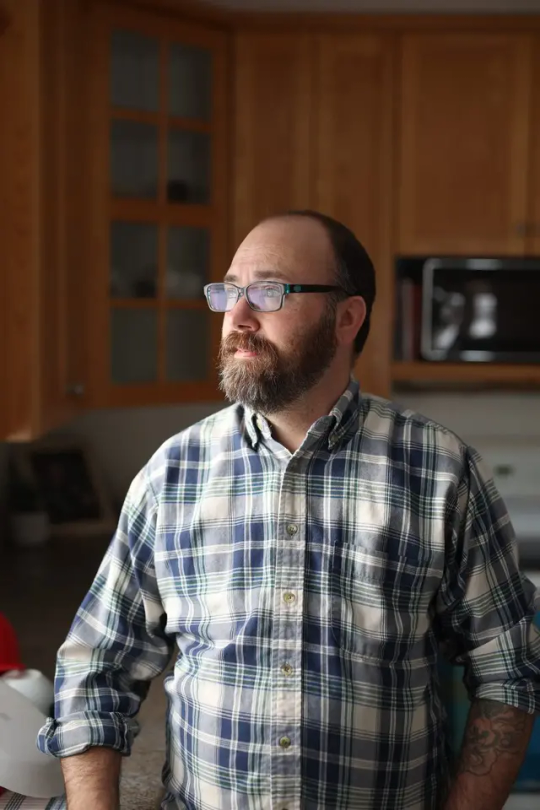
Gay men and women often told me they fear that same-sex-attracted kids, especially effeminate boys and tomboy girls who are gender nonconforming, will be transitioned during a normal phase of childhood and before sexual maturation — and that gender ideology can mask and even abet homophobia.
As one detransitioned man, now in a gay relationship, put it, “I was a gay man pumped up to look like a woman and dated a lesbian who was pumped up to look like a man. If that’s not conversion therapy, I don’t know what is.”
“I transitioned because I didn’t want to be gay,” Kasey Emerick, a 23-year-old woman and detransitioner from Pennsylvania, told me. Raised in a conservative Christian church, she said, “I believed homosexuality was a sin.”
When she was 15, Emerick confessed her homosexuality to her mother. Her mother attributed her sexual orientation to trauma — Emerick’s father was convicted of raping and assaulting her repeatedly when she was between the ages of 4 and 7 — but after catching Emerick texting with another girl at age 16, she took away her phone. When Emerick melted down, her mother admitted her to a psychiatric hospital. While there, Emerick told herself, “If I was a boy, none of this would have happened.”
In May 2017, Emerick began searching “gender” online and encountered trans advocacy websites. After realizing she could “pick the other side,” she told her mother, “I’m sick of being called a dyke and not a real girl.” If she were a man, she’d be free to pursue relationships with women.
That September, she and her mother met with a licensed professional counselor for the first of two 90-minute consultations. She told the counselor that she had wished to be a Boy Scout rather than a Girl Scout. She said she didn’t like being gay or a butch lesbian. She also told the counselor that she had suffered from anxiety, depression and suicidal ideation. The clinic recommended testosterone, which was prescribed by a nearby L.G.B.T.Q. health clinic. Shortly thereafter, she was also diagnosed with A.D.H.D. She developed panic attacks. At age 17, she was cleared for a double mastectomy.
“I’m thinking, ‘Oh my God, I’m having my breasts removed. I’m 17. I’m too young for this,’” she recalled. But she went ahead with the operation.
“Transition felt like a way to control something when I couldn’t control anything in my life,” Emerick explained. But after living as a trans man for five years, Emerick realized her mental health symptoms were only getting worse. In the fall of 2022, she came out as a detransitioner on Twitter and was immediately attacked. Transgender influencers told her she was bald and ugly. She received multiple threats.
“I thought my life was over,” she said. “I realized that I had lived a lie for over five years.”
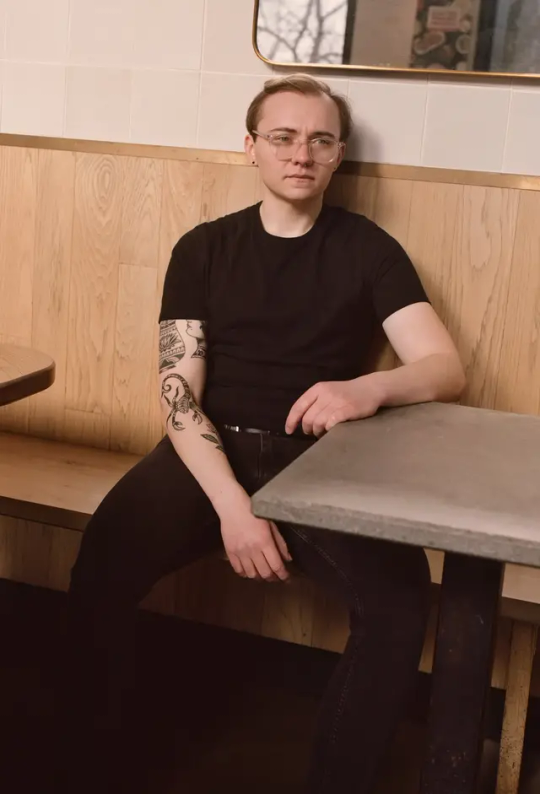
Today Emerick’s voice, permanently altered by testosterone, is that of a man. When she tells people she’s a detransitioner, they ask when she plans to stop taking T and live as a woman. “I’ve been off it for a year,” she replies.
Once, after she recounted her story to a therapist, the therapist tried to reassure her. If it’s any consolation, the therapist remarked, “I would never have guessed that you were once a trans woman.” Emerick replied, “Wait, what sex do you think I am?”
To the trans activist dictum that children know their gender best, it is important to add something all parents know from experience: Children change their minds all the time. One mother told me that after her teenage son desisted — pulled back from a trans identity before any irreversible medical procedures — he explained, “I was just rebelling. I look at it like a subculture, like being goth.”
“The job of children and adolescents is to experiment and explore where they fit into the world, and a big part of that exploration, especially during adolescence, is around their sense of identity,” Sasha Ayad, a licensed professional counselor based in Phoenix, told me. “Children at that age often present with a great deal of certainty and urgency about who they believe they are at the time and things they would like to do in order to enact that sense of identity.”
Ayad, a co-author of “When Kids Say They’re Trans: A Guide for Thoughtful Parents,” advises parents to be wary of the gender affirmation model. “We’ve always known that adolescents are particularly malleable in relationship to their peers and their social context and that exploration is often an attempt to navigate difficulties of that stage, such as puberty, coming to terms with the responsibilities and complications of young adulthood, romance and solidifying their sexual orientation,” she told me. For providing this kind of exploratory approach in her own practice with gender dysphoric youth, Ayad has had her license challenged twice, both times by adults who were not her patients. Both times, the charges were dismissed.
Studies show that around eight in 10 cases of childhood gender dysphoria resolve themselves by puberty and 30 percent of people on hormone therapy discontinue its use within four years, though the effects, including infertility, are often irreversible.
Proponents of early social transition and medical interventions for gender dysphoric youth cite a 2022 study showing that 98 percent of children who took both puberty blockers and cross-sex hormones continued treatment for short periods, and another study that tracked 317 children who socially transitioned between the ages of 3 and 12, which found that 94 percent of them still identified as transgender five years later. But such early interventions may cement children’s self-conceptions without giving them time to think or sexually mature.
‘The Process of Transition Didn’t Make Me Feel Better’
At the end of her freshman year of college, Grace Powell, horrifically depressed, began dissociating, feeling detached from her body and from reality, which had never happened to her before. Ultimately, she said, “the process of transition didn’t make me feel better. It magnified what I found was wrong with myself.”
“I expected it to change everything, but I was just me, with a slightly deeper voice,” she added. “It took me two years to start detransitioning and living as Grace again.”
She tried in vain to find a therapist who would treat her underlying issues, but they kept asking her: How do you want to be seen? Do you want to be nonbinary? Powell wanted to talk about her trauma, not her identity or her gender presentation. She ended up getting online therapy from a former employee of the Tavistock clinic in Britain. This therapist, a woman who has broken from the gender-affirming model, talked Grace through what she sees as her failure to launch and her efforts to reset. The therapist asked questions like: Who is Grace? What do you want from your life? For the first time, Powell felt someone was seeing and helping her as a person, not simply looking to slot her into an identity category.
Many detransitioners say they face ostracism and silencing because of the toxic politics around transgender issues.
“It is extraordinarily frustrating to feel that something I am is inherently political,” Powell told me. “I’ve been accused multiple times that I’m some right-winger who’s making a fake narrative to discredit transgender people, which is just crazy.”
While she believes there are people who benefit from transitioning, “I wish more people would understand that there’s not a one-size-fits-all solution,” she said. “I wish we could have that conversation.”
In a recent study in The Archives of Sexual Behavior, about 40 young detransitioners out of 78 surveyed said they had suffered from rapid onset gender dysphoria. Trans activists have fought hard to suppress any discussion of rapid onset gender dysphoria, despite evidence that the condition is real. In its guide for journalists, the activist organization GLAAD warns the media against using the term, as it is not “a formal condition or diagnosis.” Human Rights Campaign, another activist group, calls it “a right-wing theory.” A group of professional organizations put out a statement urging clinicians to eliminate the term from use.
Nobody knows how many young people desist after social, medical or surgical transitions. Trans activists often cite low regret rates for gender transition, along with low figures for detransition. But those studies, which often rely on self-reported cases to gender clinics, likely understate the actual numbers. None of the seven detransitioners I interviewed, for instance, even considered reporting back to the gender clinics that prescribed them medication they now consider to have been a mistake. Nor did they know any other detransitioners who had done so.
As Americans furiously debate the basis of transgender care, a number of advances in understanding have taken place in Europe, where the early Dutch studies that became the underpinning of gender-affirming care have been broadly questioned and criticized. Unlike some of the current population of gender dysphoric youth, the Dutch study participants had no serious psychological conditions. Those studies were riddled with methodological flaws and weaknesses. There was no evidence that any intervention was lifesaving. There was no long-term follow-up with any of the study’s 55 participants or the 15 who dropped out. A British effort to replicate the study said that it “identified no changes in psychological function” and that more studies were needed.
In countries like Sweden, Norway, France, the Netherlands and Britain — long considered exemplars of gender progress — medical professionals have recognized that early research on medical interventions for childhood gender dysphoria was either faulty or incomplete. Last month, the World Health Organization, in explaining why it is developing “a guideline on the health of trans and gender diverse people,” said it will cover only adults because “the evidence base for children and adolescents is limited and variable regarding the longer-term outcomes of gender-affirming care for children and adolescents.”
But in America, and Canada, the results of those widely criticized Dutch studies are falsely presented to the public as settled science.
Other countries have recently halted or limited the medical and surgical treatment of gender dysphoric youth, pending further study. Britain’s Tavistock clinic was ordered to be shut down next month, after a National Health Service-commissioned investigation found deficiencies in service and “a lack of consensus and open discussion about the nature of gender dysphoria and therefore about the appropriate clinical response.”
Meanwhile, the American medical establishment has hunkered down, stuck in an outdated model of gender affirmation. The American Academy of Pediatrics only recently agreed to conduct more research in response to yearslong efforts by dissenting experts, including Dr. Julia Mason, a self-described “bleeding-heart liberal.”
The larger threat to transgender people comes from Republicans who wish to deny them rights and protections. But the doctrinal rigidity of the progressive wing of the Democratic Party is disappointing, frustrating and counterproductive.
“I was always a liberal Democrat,” one woman whose son desisted after social transition and hormone therapy told me. “Now I feel politically homeless.”
She noted that the Biden administration has “unequivocally” supported gender-affirming care for minors, in cases in which it deems it “medically appropriate and necessary.” Rachel Levine, the assistant secretary for health at the U.S. Department of Health and Human Services, told NPR in 2022 that “there is no argument among medical professionals — pediatricians, pediatric endocrinologists, adolescent medicine physicians, adolescent psychiatrists, psychologists, et cetera — about the value and the importance of gender-affirming care.”
Of course, politics should not influence medical practice, whether the issue is birth control, abortion or gender medicine. But unfortunately, politics has gotten in the way of progress. Last year The Economist published a thorough investigation into America’s approach to gender medicine. Zanny Minton Beddoes, the editor, put the issue into political context. “If you look internationally at countries in Europe, the U.K. included, their medical establishments are much more concerned,” Beddoes told Vanity Fair. “But here — in part because this has become wrapped up in the culture wars where you have, you know, crazy extremes from the Republican right — if you want to be an upstanding liberal, you feel like you can’t say anything.”
Some people are trying to open up that dialogue, or at least provide outlets for kids and families to seek a more therapeutic approach to gender dysphoria.
Paul Garcia-Ryan is a psychotherapist in New York who cares for kids and families seeking holistic, exploratory care for gender dysphoria. He is also a detransitioner who from ages 15 to 30 fully believed he was a woman.
Garcia-Ryan is gay, but as a boy, he said, “it was much less threatening to my psyche to think that I was a straight girl born into the wrong body — that I had a medical condition that could be tended to.” When he visited a clinic at 15, the clinician immediately affirmed he was female, and rather than explore the reasons for his mental distress, simply confirmed Garcia-Ryan’s belief that he was not meant to be a man.
Once in college, he began medically transitioning and eventually had surgery on his genitals. Severe medical complications from both the surgery and hormone medication led him to reconsider what he had done, and to detransition. He also reconsidered the basis of gender affirmation, which, as a licensed clinical social worker at a gender clinic, he had been trained in and provided to clients.
“You’re made to believe these slogans,” he said. “Evidence-based, lifesaving care, safe and effective, medically necessary, the science is settled — and none of that is evidence based.”

Garcia-Ryan, 32, is now the board president of Therapy First, an organization that supports therapists who do not agree with the gender affirmation model. He thinks transition can help some people manage the symptoms of gender dysphoria but no longer believes anyone under 25 should socially, medically or surgically transition without exploratory psychotherapy first.
“When a professional affirms a gender identity for a younger person, what they are doing is implementing a psychological intervention that narrows a person’s sense of self and closes off their options for considering what’s possible for them,” Garcia-Ryan told me.
Instead of promoting unproven treatments for children, which surveys show many Americans are uncomfortable with, transgender activists would be more effective if they focused on a shared agenda. Most Americans across the political spectrum can agree on the need for legal protections for transgender adults. They would also probably support additional research on the needs of young people reporting gender dysphoria so that kids could get the best treatment possible.
A shift in this direction would model tolerance and acceptance. It would prioritize compassion over demonization. It would require rising above culture-war politics and returning to reason. It would be the most humane path forward. And it would be the right thing to do.
*~*~*~*~*~*
For those who want tor ead more by those fighting the cancellation forquestioning, read:
Graham Lineham, who's been fighting since the beginning and paid the price, but is not seeing things turn around.
The Glinner Update, Grahan Linehan's Substack.
Kellie-Jay Keen @ThePosieParker, who's been physically attacked for organizing events for women demanding women-only spaces.
REDUXX, Feminst news & opinion.
Gays Against Groomers @againstgrmrs, A nonprofit of gay people and others within the community against the sexualization, indoctrination and medicalization of children under the guise of "LGBTQIA+"
#detransitioners#detransition#gender critical#New York Times#gays#lesbians#trans#trans insanity#long post#article#detrans#transgender#post trans#desisted
699 notes
·
View notes
Text
PERSONAL YEARS IN NUMEROLOGY - P2




This post is very honest. It’s not meant to fear monger just what I’ve witnessed in other people's lives and what I’ve experienced myself as well
If you don’t already know how to find personal years in numerology click here
tw: substance abuse

Personal Year Numbers
❍ . ┊PY1: These are years full of lots of new beginnings and great years to be a leader. These are good years to spend time with your father/fatherly figure (if you have one). At worst you will experience lots of conflicts and arguments these years or problems with aggression
❍ . ┊PY2: These will be years full of peace (of course I personally believe astrology supersedes numerology so if your astrology (Solar return, transits, etc.) isn’t great that year it may not be. You may feel more sensitive during these years than others. These are good years for relationships, writing, being your in your divine feminine energy, spending time with your mother/motherly figure (if you have one), and/or bringing more balance/harmony into your life
❍ . ┊PY3: These will be lucky years for you (depending on the astrology - solar return chart, transits, etc.) and also good years to express yourself through your passions or hobbies. You’ll have lots of laughs during these years with your friends/lovers. These are good years involving communication as well, so it can be beneficial also if you are trying to be a mouth-piece for something. You will feel more of your child-like energy come out during these years and more creative as well. At worst there could be lots of drama/gossip in your life during these years
❍ . ┊PY4: These are the best years to put in work, have lots of self discipline, and create a routine. When doing this you can earn lots of money. Your values in life will become more clear to your during these years. At worst you could get in trouble with the law or fall victim to drug abuse
❍ . ┊PY5: These years will be full of new exciting events and change. These are great years for traveling, having children, having good sex, embracing your sexuality, becoming healthier, having a glow up or doing things involving beauty (ex: modeling), and being involved in the entertainment industry (ex: acting, performing, etc.)
❍ . ┊PY6: These years are great for spending time with your family, making friends/spending time with your friends, being your most responsible self, becoming more organized/put together, and showing people you care about them. At worst conflict could occur involving the government or lots of time could be wasted
❍ . ┊PY7: These are great years for learning new things, teach others, or open your own food/beverage place. You may keep to yourself more during these years. At worst you could get cheated on, have a rough time in your love life during these years, gamble too much (in any way not just with money), get injured, have challenges involving health/money, or feel lots of loneliness. Try not to do any type of dangerous activities or start a new relationship/get married during these years or it can lead to challenges down the road
❍ . ┊PY8: These are the second best years to make money. They’re also great years to work hard, become more grounded, and be logical. You can gain lots of power during these years. At worst you could create negative karma for yourself or use your power for bad things. Try not to hurt others, steer clear of drama/conflict, and do good for others during these years so you can create positive karma for yourself instead
❍ . ┊PY9: These are the best years to gain spiritual knowledge and knowledge in general as well as become the highest vibrational version of yourself if navigated correctly. These can either be the worst or best years of your life (no in between) depending on how you choose to navigate it. These are great years for crypto. Lots of things in your life may come to an end this year and you may have to experience the challenges of letting go and adapting to new environments or things. Keep yourself at a high vibration during these years and try to be a good person
Master & Special Numbers
❍ . ┊PY11: You will be able to find lots of inspiration during these years and find ways to strongly express yourself through emotional outlets. These are the best years to gain social media fame in. You can meet your soulmates during these years or have lots of success in your love life. These may be very emotional years at worst
❍ . ┊PY22: You will gain lots of wisdom during these years and learn to let go of bad habits or bad people in your life. These years are also great years to build in any form (ex: body building, building houses, building a relationship to be stronger, etc.). At worst there could be lots of destruction in your life during these years but luckily it will lead to renewal by the next year
❍ . ┊PY33: These years are great for making an influence on others or teaching others. These are high vibrational years. At worst you will learn challenging lessons about your ego or have a challenging ego death
❍ . ┊PY13: These years can be great for manifesting. At worst you’ll experience lots of anxiety during these years
❍ . ┊PY17: These are the best years for you to gain fame out of all the numbers (17 represents fame in numerology)
❍ . ┊PY19: I do not mean to fear monger with this I only intend to have full honesty, but I will say every time that I’ve had this it’s been a really challenging year for either my life in general or my health. Make sure to eat really healthy, exercise, and be kind to people during these years so you can maintain good health and not create more negative karma for yourself (19 is the number of bad health and negative karma)
❍ . ┊PY28: These are the best years for you to gain wealth or make money quickly. Money will come to you whenever you need it most during these years

MASTERLIST - SUB TO MY PATREON - NUMEROLOGY

© 𝐚𝐬𝐭𝐫𝐨𝐬𝐤𝐲 𝟐𝟎𝟐𝟑 𝐚𝐥𝐥 𝐫𝐢𝐠𝐡𝐭𝐬 𝐫𝐞𝐬𝐞𝐫𝐯𝐞𝐝
#personal years#numerology personal year number#numerology#numerology personal year#personal year number#personal year#numerology community
505 notes
·
View notes
Text
Need a reason to live?
Recently, I made four polls with eleven reasons to live in each. Most of those reasons were given to me by people who have also been suicidal in the past, and I decided to compile them into one long list (plus some) for anyone who needs it to come back to when they're out of reasons to keep going.
⚠️ Disclaimer: Please do not turn this into one of those "ALWAYS REBLOG IF YOU SEE" posts. Thank you. ⚠️
Relationships
Your furry companion(s) (this means pets and friends who are furries <3)
Your friends
Your family
Those who look up to you
To reconnect with someone you haven't seen in a while
Your headmates (specific to those who are apart of systems)
There's someone who isn't around anymore who would want you to keep going
To eventually be a mentor to someone
To make sure your animals never have to sleep alone
To fall in love
Your partner
To meet your online friends/mutuals
To tell your mentor/the people who raised you with kindness that you made it
To see someone close to you through their final days
To make it big enough to eventually provide for those you care about
Your FP (personality disorder specific)
Group photos with your (found) family and friends
To help your friends do the same
The friends you've yet to meet
A promise you made to someone special
Acts of kindness
To be there when someone needs you
To see someone smile because of you
To make a stranger's day a little brighter
To hand out compliments to those who need it
To make the world a little bit better before you go
To treat the people around you the way you wish you'd been treated
To be the one person in someone's life who is there unconditionally.
To help someone you love to quit an addiction
To do charitable deeds
Affection
Hugs from someone you trust
Kisses from a partner, close friend or pet
Cuddles when it's cold/lonely
To laugh until your stomach hurts
Forehead touches
To hold someone so tight that they're wheezing
Doting on people when they're feeling down
To make the people around you laugh
Interests
That new game/movie/show/book/album/etc. that you’ve been waiting for
Telling everyone and anyone who will listen about your special interest/hyperfixations
To share creations that aren't appreciated enough
To save up for something that would make life more bearable
To finally complete a collection
Projects would be left unfinished
To travel
To complete a project you've been working on for a long period of time
Projects you've yet to come up with
To start participating in special interests you've had to put on hold
To laugh at the creations you made when you were younger and less experienced
Those who consume your work would never get to see another creation of yours
Spite (because I think spite deserves Its own section:))
To stick it to your abusers
To prove your younger self wrong
To prove the people around you wrong
To prove your younger self right
To prove the people around you right
To spit on the grave of someone who hurt you
As a big 'fuck you' to the world and everyone in it who tried to silence you
To outlive your enemies
To do something that you've never been allowed to do (get a piercing, tattoo, cut or dye your hair, etc.)
To show off your success to the people who doubted you
To make sure whoever hurt you doesn't win
Milestones
You've got a milestone of some kind that you'd like to reach before you go
To see your (future) children reach a milestone of their own
To see a birthday you never thought you'd make it to
To graduate from school
To see your wounds from self-harm heal
To experience old age
To get married
To recover from your eating disorder
To experience independence
To start/complete your transition
To go on your first date
To get your first job
To adopt a child and give them the life that they deserve
To rescue a pet and give them a home
To purchase your first car
To rent/purchase your first house/apartment
To have your first child
To lose your virginity
To experience the joy of knowing you escaped/got through a bad situation
To eventually publish your own book/art piece/etc.
Miscellaneous
To finally get diagnosed with something important
So if nothing else, you can still say you survived
You have a bucket list you'd like to complete
To live because you want to, not because others want you to
Comfort drinks with someone you love
You wrote a letter to yourself that you can't open until a certain date/birthday
Those rare and valuable pieces of media with good representation of a minority/marginalised group.
To read through past conversations with people and cringe/laugh/cry.
All the different foods you've yet to try
To see the world become more accommodating to those who need it
To watch the seasons change
To celebrate the holidays
For those days where you do feel okay, perhaps even good
To eventually replace the stuff in your closet with things that represent who you are now
To read back on journals and diaries you made when you were younger
If you are not in a place where any of these help, that's more than okay as well. It will be here if and when you ever need it. Being suicidal can be extremely lonely and scary and we all deal with it in different ways.
If you have your own reason and you feel comfortable sharing it with me, let me know via asks or DM and it will be added as soon as I can 💞
#reasons to live#npd safe#bpd safe#did#osdd#tw eating disorders#tw self harm#tw death#tw abuse#mental health#positivity#neurodivergent#cluster b safe
830 notes
·
View notes
Text
I feel like ive seen a lot of people talk about the whole "conservatives calling everyone they dont like 'groomers'" thing but theres a quiet part no one has said out loud
They think allowing children to identify as queer and allowing trans kids to transition is a form of sexual abuse
They have reduced the definition of "grooming," from a complex process of an adult gaining a child's trust in order to sexually abuse them, to "anything which normalizes (what i consider to be) sexual abuse"
By their perverse logic, the very existence of queer people is "grooming." By their perverse logic, the only solution is to eliminate queer people from public view.
1K notes
·
View notes
Text
Since the discourse has reared its ugly head once more, the simple answer is no.
Aang was not a deadbeat, unsupportive, absentee father.
He loved all three of his children and was supportive of them. When Kya came out in the comics, she mentioned straight up that Aang was nothing but supportive of her and who she was. Aang made mistakes in parenting, but he was also stuck in one of the worst situations possible for him.
For one thing, it's been stated that Airbending culture has different views when it comes to family dynamics. Never once does Aang mention his parents, and it's clear that Air Nomads did not put emphasis on the standard nuclear family organization that other nations did. From context clues alone, and many have inferred in the past that Air Nomads were communal, so it stands to reason that their parenting was communal. Monks, Nuns, Masters—all of them were most likely parents to every single child. The responsibility of raising and educating a child was shared amongst the nomads, and that there was no real difference between biological and adoptive parents. Airbenders shared nearly everything, and that meant family as well.
Imagine you're Aang, spending twelve years of life being raised by every adult in the temple. Sure, he was exposed to nuclear family dynamics when visiting other nations and befriending Bumi and Kuzon, but his exposure to their culture was most likely limited. Now, not only is he a father to three beautiful children, but he must raise them in a way foreign to him. There are no other Monks to raise his children—it's just him and Katara. I've no doubt that Sokka and Toph chipped in whenever they could to ease the burden of parenthood, but they were leaders and figures of great importance as well. Not to mention that Toph had her own daughters to take care of.
Aang is also the Avatar, the central spiritual figure amongst the four nations. His presence would always be demanded in other nations. Peace Summits. Negotiations. Ceremony. Dealing with splintered Fire Nation cells and loyalists. Aang had to lead the people of all four nations back into balance, and he was in the unique and unenviable position to heal the scars of a 100 year war due to the absence of the Avatar.
Finally, the dude is also the Very Last Airbender. Of course he'd show favoritism to Tenzin. Bumi was a non-bender and Kya was a waterbender already taking after her mother. Aang was a war hero, a political figure, a man out of time and history, the Avatar, and the Only Living Airbender. The weight of his culture and people all rested on his shoulders, and so he passed on that responsibility and hope to the only other living Airbender at the time. Aang needed to spend time with Tenzin because only through Tenzin could the practices of the Air Nomads survive.
Aang was basically having to transition from a communal family mindset to a nuclear family's; he had to balance romance, fatherhood, and being the Avatar in a Wartorn World; and he had an obligation to every Airbender in history—millions of souls and their memories, passed on from one very flawed father to his newborn son. Every part of Aang's life as a father was met with trials and tribulations, and his family still came out loving him, albeit with some resentment underneath.
No parent is perfect, and Aang could have done so much better when it came to communicating with his children.
But none of his mistakes ever meant he was an abusive, cold, distant father.
He was overworked, acclimating to a style of family not his own, and desperately reviving a century-long dead culture all by himself. The fact that every single one of his kids still loved him and cherished him only solidified the fact that Aang was a father who did his very best.
Being the child of the Avatar would always mean living in his shadow. That resentment, of Aang being needed by the world while his children sought him out, would always be there. Doubly so for Tenzin, who grew up with the Avatar as his father and continued his life-long work of breathing life back into the Air Nomads. Say what you will, but at least Bumi and Kya had the freedom to choose who they wanted to be. Tenzin, no matter what, would always grow up to be the Airbending Master because no one else could.
Aang loved his children. Aang loved his wife. And they in turn loved him. But just like every family, complications rose up and planted the seeds of bitterness and resentment. The only thing that stopped these from blossoming into actual dislike of their family was that Aang's love and respect for his children was always genuine, and that Katara stood firm in making sure their children knew they were beloved.
Aang and Katara's family would never have been ideal in the first place, but they did their best.
And their best was certainly enough.
#avatar the last airbender#aang#katara#bumi ii#kya ii#bumi#kya#tenzin#avatar meta#paprikash ramblings#sokka#toph beifong
321 notes
·
View notes
Text
Not to scare people but like. Im going to do that because being informed is good.
I've been seeing people dismissing the "no social transition without medical oversite" bit as "unenforceable" so im going to tell you a bit about things that have already happened to my child well BEFORE the cass report.
My child has dealt with social services and school bullying them for having short hair, trying to force them to wear dresses and skirts, not simply refusing to use their name and pronouns but also accusing me of child abuse for allowing them to use whatever name and pronouns they chose, accusing my child of harming other children for wanting to not stand in the girls line, barring them from playing football etc.
The "damage" of being allowed to socially transition was, in their opinion, so severe that my child was put on a child protection plan (officially due to my child's repeated suicide attempts, which they put down to me being too "permissive" about their gender. When in reality the reason for the suicide attempts was the treatment they recieved in school). The really FUN bit about a child protection plan is if you do not comply, you WILL lose your child. I was forced to abuse my child for years and they will never face consequences for this.
The cass report will only embolden people with these beliefs, and there is already everything they need to enforce it. They have already been doing it.
188 notes
·
View notes
Text
UK petition: Do not require schools to tell parents their child is transgender/non-binary
[ Sign here ]
There are reports that the Government is planning to introduce guidance stating that schools in England must inform parents if a young person seeks to change their name or starts wearing different uniform. We believe this information should be kept confidential, unless the child chooses to share it.
For many trans and non-binary children, school is a safe space where they can escape any transphobia at home and live as their preferred gender. We are concerned about reports of new Government guidance that would require schools to tell a trans or non-binary child's parents if the child wishes to socially transition in school. This has the potential to put these children in danger of abuse at home
This will not only affect today's children, but children of future generations. We need to stop this before it is too late.
Deadline: 27 October 2023
Signatures: 36,987 (track here) - 100,000 needed for a debate in parliament
Who can sign?
Anyone living in the UK, regardless of citizenship, and
Anyone with UK citizenship living anywhere in the world.
275 notes
·
View notes
Text
What is the family? So deep runs the idea that the family is the exclusive place where people are safe, where people come from, where people are made, and where people belong, it doesn’t even feel like an idea anymore. Let us unpick it, then.
The family is the reason we are supposed to want to go to work, the reason we have to go to work, and the reason we can go to work. It is, at root, the name we use for the fact that care is privatized in our society. And because it feels synonymous with care, “family” is every civic-minded individual’s raison d’être par excellence: an ostensibly non-individualist creed and unselfish principle to which one voluntarily signs up without thinking about it. What alternative could there be? The economic assumption that behind every “breadwinner” there is a private someone (or someones) worth being exploited for, notably some kind of wife—that is, a person who is likely a breadwinner too—“freely” making sandwiches with the hard-won bread, or hiring someone else to do so, vacuuming up the crumbs, and refrigerating leftovers, such that more bread can be won tomorrow: this feels to many of us like a description of “human nature.”
Without the family, who or what would take responsibility for the lives of non-workers, including the ill, the young, and the elderly? This question is a bad one. We don’t hesitate to say that nonhuman animals are better off outside of zoos, even if alternative habitats for them are growing scarcer and scarcer and, moreover, they have become used to the abusive care of zoos. Similarly: transition out of the family will be tricky, yes, but the family is doing a bad job at care, and we all deserve better. The family is getting in the way of alternatives.
In part, the vertiginous question “what’s the alternative?” arises because it is not just the worker (and her work) that the family gives birth to every day, in theory. The family is also the legal assertion that a baby, a neonatal human, is the creation of the familial romantic dyad; and that this act of authorship in turn generates, for the authors, property rights in “their” progeny—parenthood—but also quasi-exclusive accountability for the child’s life. The near-total dependence of the young person on these guardians is portrayed not as the harsh lottery that it patently is, but rather as “natural,” not in need of social mitigation, and, furthermore, beautiful for all concerned. Children, it is proposed, benefit from having only one or two parents and, at best, a few other “secondary” caregivers. Parents, it is supposed, derive nothing so much as joy from the romance of this isolated intensity. Constant allusions to the hellworld of sheer exhaustion parents inhabit notwithstanding, their condition is sentimentalized to the nth degree: it is downright taboo to regret parenthood. All too seldom is parenthood identified as an absurdly unfair distribution of labor, and a despotic distribution of responsibility for and power over younger people. A distribution that could be changed.
Like a microcosm of the nation-state, the family incubates chauvinism and competition. Like a factory with a billion branches, it manufactures “individuals” with a cultural, ethnic, and binary gender identity; a class; and a racial consciousness. Like an infinitely renewable energy source, it performs free labor for the market. Like an “organic element of historical progress,” writes Anne McClintock in Imperial Leather, it worked for imperialism as an image of hierarchy-within-unity that grew “indispensable for legitimating exclusion and hierarchy” in general. For all these reasons, the family functions as capitalism’s base unit—in Mario Mieli’s phrase, “the cell of the social tissue.” It may be easier to imagine the end of capitalism, as I’ve riffed elsewhere, than the end of the family. But everyday utopian experiments do generate strands of an altogether different social tissue: micro-cultures which could be scaled up if the movement for a classless society took seriously the premise that households can be formed freely and run democratically; the principle that no one shall be deprived of food, shelter, or care because they don’t work.
Sophie Lewis, Abolish the Family
1K notes
·
View notes
Note
Are there any good examples of how the right demonizes pro-queer straight folks specifically?
You mean other than calling parents who support their children transitioning child "abusers and groomers", harassing them, and creating laws to take their children out of their custody?
They usually don't actually separate straight allies from queer people rhetorically. We all have "blue hair and pronouns." It does not help them - and in fact hurts their points - to acknowledge that we have allies at all. So they usually don't, instead simply referring to anyone who objects to their bigotry as if they are also queer. The idea is to make it appear as if we are all alone, that no one supports us, rather than that the majority of US citizens think these bills are cruel bullshit.
Their anti-queerness is a way of enforcing gender roles on GNC straight people regardless of their politics as well. If you look too "swishy" (as my father would say) as a man or too butch as a woman, it doesn't matter what your politics are, you are a Suspected Queer and will suffer.
One of the only times they actually do anything that doesn't assume that our allies are secretly just queers is when dealing with the parents of minor trans people who are in straight-appearing marriages. By their logic, if you're in a marriage like that, you can't be queer, so they shift tactics and refer to the moms especially as having some sort of "Munchausen by proxy" wherein they're forcing their children to transition. They are trying to "get attention" through their children, and they're trying to "trans the gay away" and end up with a straight child who is trans (rather than a GNC gay kid??) so they don't have to deal with the "shame" of having a gay child is the theory. That these two things are totally opposed and make no sense doesn't really seem to bother transphobes.
511 notes
·
View notes